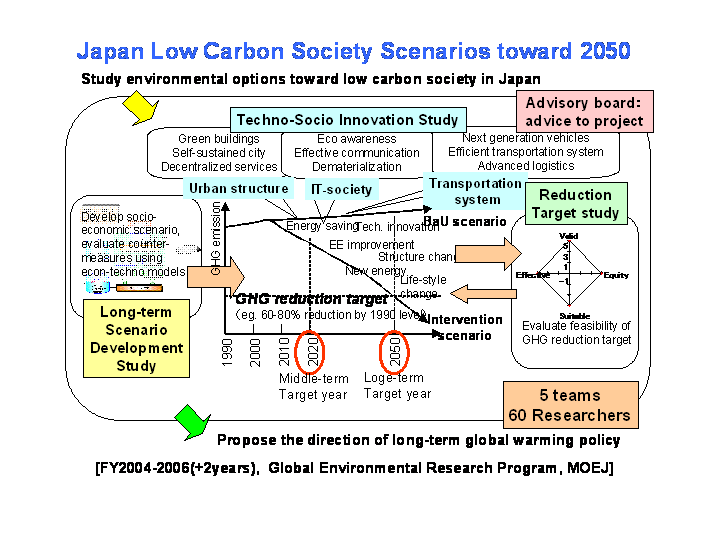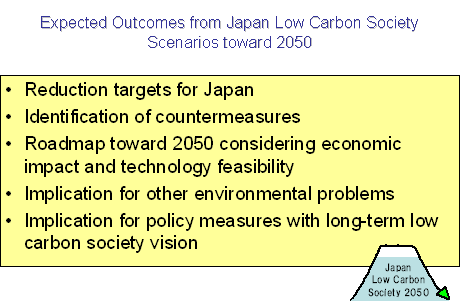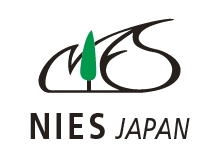

 |
 |
|||||||
 |
| The first great step to prevent global warming was taken by Kyoto Protocol which came into effect on Feb.16, 2005. But it is necessary to reduce GHG (Greenhouse gases) emissions drastically to stabilize climate change. Japan is also required to assess its long-term global warming policy. A large part of social infrastructure is likely to be replaced by 2050. It would be possible to propose concrete policy packages including institutional change, technology development, and lifestyle change toward low carbon society. |
| This project focuses on the following issues: 1) long-term scenario development study to integrate environmental options consistently using simulation models, 2) long-term GHG reduction target setting considering effectiveness and validity, and 3) assessment of environmental options considering future socio-economic conditions in a) urban system, b) information technology (IT) society and c) transportation system. |
| We have the above 5 sub projects consisting of research experts in those areas. We have developed social and technically consistent middle and long-term global warming policy. |
| To show probable paths toward a low carbon society in Japan which is compatible with economic development, would enhance public interest and lead to social and lifestyle changes. We propose to offer the latest research findings. |
| We have developed the narrative storylines, their quantitative scenarios, and environmental options especially in urban system, IT society, transportation system till 2020. We have also simulated the required GHG reduction for Japan. We have investigated the scenarios toward 2050 with back-casting method. The desired Japan 2050 future images with 60-80% GHG reduction will be set and the path considering economic impact, technological possibility, institutional and lifestyle change will be simulated objectively and consistently. |
| [Researchers] |
| Project Leader: Shuzo Nishioka (NIES), Research Coordinator: Junichi Fujino (NIES) |
| Team Leader: Mikiko Kainuma(NIES) for scenario study, Norichika Kanie(TITech) for target setting, Keisuke Hanaki (University of Tokyo: UT) for urban system, Jun Fujimoto(UT) for Information Technology based society, Yuichi Moriguchi for transportation system. |
| Affiliations of researchers who participated in this project (FY 2004-2008): |
| National Institute for Environmental Studies (NIES), National Institute
of Advanced Industrial Science and Technology (AIST), Forestry and Forest Products Research Institute (FFPRI), The Institute for Global Environmental Strategies (IGES), The Japan Institute of Energy (JIE), Kyoto University, Kobe University, Nagoya University, Tokyo Institute of Technology (TIT), The University of Tokyo, Shinsyu University, Bunkyo University, Tokyo University of Marine Science and Technology, Tokyo University of Science (TUS), Ritsumeikan University, Waseda University, Keio University, Nippon Institute of Technology (NIT), International University of Japan (IUJ), Toyo University, University of Tsukuba, Seikei University, Shiga University, Nippon Telegraph and Telephone Corporation (NTT), Mizuho Information & Research Institute, Inc., Mitsubishi Research Institute, Inc., Japan Knowledge Laboratory Co. Ltd, Nikken Sekkei Research Institute (NSRI), FUJITSU LIMITED, NEC Corporation |
| About 60 researchers participate in this project from the organizations above. |
 |
 |
| We held International Symposium, "Low-Carbon Society Scenario toward 2050: Scenario Development and its Implication for Policy Measures" on March 23rd 2005, including UK, Germany, France, and Netherlands experts. Please visit the following website: http://2050.nies.go.jp/sympo/050324/ |
 |
 |